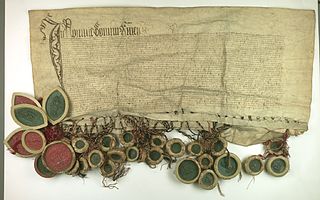
The Prussian Confederation was an organization formed on 21 February 1440 at Kwidzyn by a group of 53 nobles and clergy and 19 cities in Prussia, to oppose the arbitrariness of the Teutonic Knights. It was based on an earlier similar organization, the Lizard Union established in 1397 by the nobles of Chełmno Land.

The Teutonic Order is a Catholic religious institution founded as a military society c. 1190 in Acre, Kingdom of Jerusalem. The Order of Brothers of the German House of Saint Mary in Jerusalem was formed to aid Christians on their pilgrimages to the Holy Land and to establish hospitals. Its members have commonly been known as the Teutonic Knights, having historically served as a crusading military order for supporting Catholic rule in the Holy Land and the Northern Crusades during the Middle Ages, as well as supplying military protection for Catholics in Eastern Europe.

Bornheim is a town in the Rhein-Sieg district, in North Rhine-Westphalia, Germany. It is situated on the West bank of the Rhine, approx. 10 km north-west of Bonn, 20 km south of Cologne.
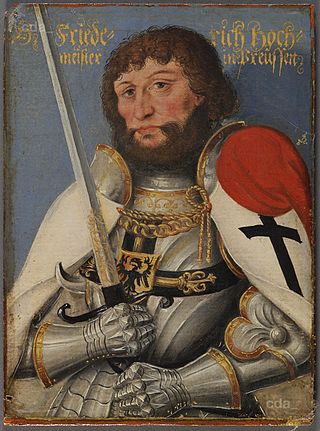
Duke Frederick of Saxony, also known as Friedrich von Sachsen or Friedrich von Wettin, was the 36th Grand Master of the Teutonic Order, serving from 1498–1510. He was the third son of Albert III, Duke of Saxony, and Sidonie of Poděbrady, daughter of George of Podebrady.

The grand master of the Teutonic Order is the supreme head of the Teutonic Order. It is equivalent to the grand master of other military orders and the superior general in non-military Roman Catholic religious orders. Hochmeister, literally "high master", is only used in reference to the Teutonic Order, as Großmeister is used in German to refer to the leaders of other orders of knighthood.
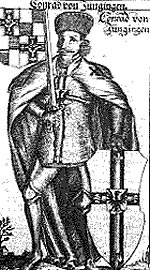
Konrad von Jungingen was a Grand Master of the Teutonic Order from 1393 to 1407. Under his administration, the Teutonic Order would reach its greatest extent.

Ludwig von Erlichshausen (1410–1467) was the 31st Grand Master of the Teutonic Knights, serving from 1449/1450 to 1467.

Konrad von Erlichshausen or Ellrichshausen, was born in 1390 or 1395 at Ellrichshausen, near Satteldorf in Swabia and died in 1449 in the Malbork Castle. He was the 30th Grand Master of the Teutonic Order he led from 1441 to 1449. He was succeeded by his cousin Ludwig von Erlichshausen.

The Treaty of Melno or Treaty of Lake Melno was a peace treaty ending the Gollub War. It was signed on 27 September 1422, between the Teutonic Knights and an alliance of the Kingdom of Poland and the Grand Duchy of Lithuania at Lake Melno, east of Graudenz (Grudziądz). The treaty resolved territorial disputes between the Knights and Lithuania regarding Lithuania Minor and Samogitia, which had dragged on since 1382, and determined the Prussian–Lithuanian border, which afterwards remained unchanged for about 500 years. A portion of the original border survives as a portion of the modern border between the Republic of Lithuania and Kaliningrad Oblast, Russia, making it one of the oldest and most stable borders in Europe.

Heinrich Reuß von Plauen was the 32nd Grand Master of the Teutonic Order, serving from 1467 to 1470. He was the nephew of the previous Grand Master, Ludwig von Erlichshausen, and a distant relative to the 27th Grand Master, Heinrich von Plauen.

This is the 1422 Polish-Teutonic War. For a list of all Polish-German Wars, see Polish-German Wars.
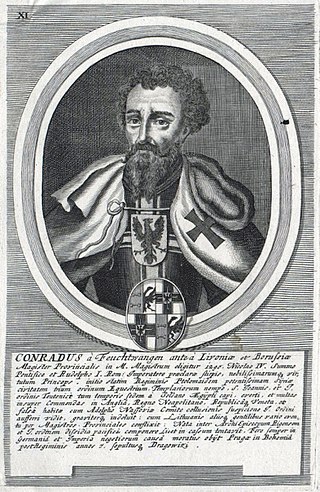
Konrad von Feuchtwangen was the 13th Grand Master of the Teutonic Knights from 1290 to 1296.

Wolfgang Schutzbar was the 39th Grand Master of the Teutonic Order, serving from 1543 to 1566.

Francis Louis of Palatinate-Neuburg was bishop and archbishop of several dioceses, prince-elector of the Holy Roman Empire, and Hochmeister of the Teutonic Order.

Polish–Teutonic Wars refer to a series of conflicts that took place between the Kingdom of Poland and the Teutonic Order, a medieval German military order with roots in the Baltic region. These wars occurred primarily during the 14th and 15th centuries and were characterized by territorial disputes, political maneuvering, and religious differences.

This is the 1308 Polish-Teutonic War. For a list of all Polish-German Wars, see Polish-German Wars.

This is the 1431-1435 Polish-Teutonic War. For a list of all Polish-German Wars, see Polish-German Wars.
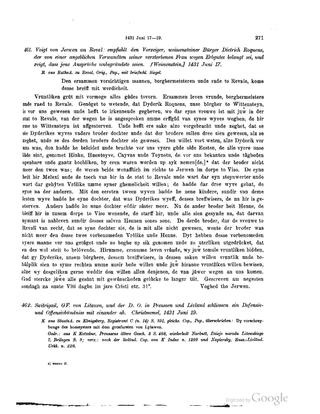
The Treaty of Christmemel was a treaty signed on 19 June 1431 between Paul von Rusdorf, Grand Master the Teutonic Knights, and Švitrigaila, Grand Duke of Lithuania. Švitrigaila was preparing for a war with Poland to defend his claim to the Lithuanian throne and sought allies. The treaty established an anti-Polish alliance and prompted the Knights to invade the Kingdom of Poland, starting the Polish–Teutonic War (1431–35). Lithuania also surrendered Palanga and three miles of the coastline on the Baltic Sea, thus modifying the Treaty of Melno of 1422.
Invasion of Poland may refer to:
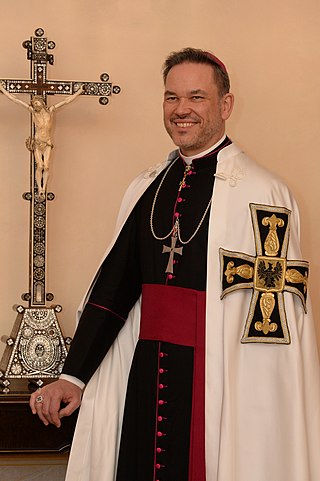
Frank Bayard is a German Catholic priest and 66th Grand Master of the Teutonic Order.



















